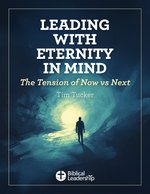4 feelings church members experience in times of change

Well, here we are, exploring a new frontier. America is emerging from quarantine, churches are opening for Sunday services, and God’s people are eager to gather in worship.
None of us has ever been here before. No one in world history has stepped out into the world that awaits us. Pastors must figure out how to do something that’s never been done: re-open a church that was closed to stop the spread of plague. How do we do this? We can’t just pick up where we left off in February, so what do we do?
The disorientation and uncertainty these questions evoke typify major personal and organizational transitions. It sets in when we realize that what we used to call “normal” has slipped away and will never return.
This loss of normalcy is the first phase that churches go through during periods of change and transition. William Bridges, in his book Managing Transitions, observes that transition occurs in three phases:
- An ending
- The neutral zone
- A new beginning
Right now every church in America is in the neutral zone.
What are our church members experiencing during this vast stretch of uncertainty and change that lies before us? How do we keep a church moving ahead, reassure anxious members, soothe stressed-out staff, and keep ourselves on level ground when we have but a vague notion of how this will eventually turn out? Most people will experience four common feelings.
Uncertainty
The first thing people experience is uncertainty. This happens because familiar work patterns, schedules, deadlines, and established procedures have become useless. Consider a few ways that uncertainty creeps in to sow frustration.
- How will we keep people informed of what’s going on if we can’t distribute a Sunday worship program and make platform announcements?
- What will happen to our income if we can’t take up an offering at our worship services?
- Where do we use staff who mainly kept the office running smoothly and greeted the public when we don’t have office hours?
- Who is going to help us produce our online services, and what standard of excellence should we strive for in these videos?
Some people do just fine with uncertainty. These are the types that thrive on chaos and who are energized by constant change swirling around them. But most people are scared to death of uncertainty—they have no idea what to do. That leads to a second common experience in the Neutral Zone:
Doubt
The pessimists in your midst will have serious doubt about the church’s future. The mavericks on staff, in volunteer positions, or in elected office will doubt your leadership abilities when times get tough. The malcontents doubt that anyone’s paying attention to their mischief and think it is safe to make a power play. As additional unforeseen circumstances arise, you may begin to doubt yourself and perhaps even God.
Fatigue
You and the church leaders will be making lots of ad hoc decisions, and those decisions will often have to be changed on the fly! You discover, for example, that you can’t get audio that’s good enough for YouTube or Facebook streaming out of that cheap condenser microphone, so you’ve got to make changes to when and how you record your services. Or you find out on Wednesday evening that the Youth Pastor’s laptop doesn’t have a webcam to connect with kids on Zoom, so those plans go out the window.
I’m sure that every one of you could add dozens of on the fly changes, made on the spot, over these past two months.
And you know what that constant pressure of having to make snap decisions, of having to cook up new and novel plans does after a while?
It produces fatigue. Mental fatigue. Physical fatigue. Emotional fatigue. Morale begins to plummet and even those who set off into the Neutral Zone with a sense of adventure in their hearts eventually get to the place where they are numb. And that leads to a fourth emotion that’s common in this period:
Resentment
I’ve experienced this myself lately. I’ve been working with a lot of pastors these past few months and putting in a lot of extra volunteer hours at my home church. It has started to weigh on me, and I have found myself feeling impatient with others. Without justification I’ve jumped to some unfavorable conclusions about others, thinking things that would never have entered my mind were it not for the crush of the Neutral Zone.
So, how is a pastor supposed to lead a church through this neutral zone so that it is positioned for vigorous, life-changing mission when it finally arrives on that far shore we lovingly call the “new normal?” That’s the subject of my next blog.
| Bud Brown is an experienced ministry leader, writer and educator. He is co-founder of Turnaround Pastors and co-author of the ground-breaking Pastor Unique: Becoming A Turnaround Leader. He brings special expertise to change leadership in the local church, mentoring pastors to become revitalization leaders, training churches how to find and recruit the best talent, and training leadership teams how to achieve their shared goals. Learn More » |
More on COVID-19
- An easy way to gauge your church's growth and decline (by Thom Rainer)
- 20 of the most difficult things pastors have done in their job (by Thom Rainer)
- What's your thought process for the new year? (by Rob Streetman)
- 5 major developments for small churches (by Thom Rainer)


